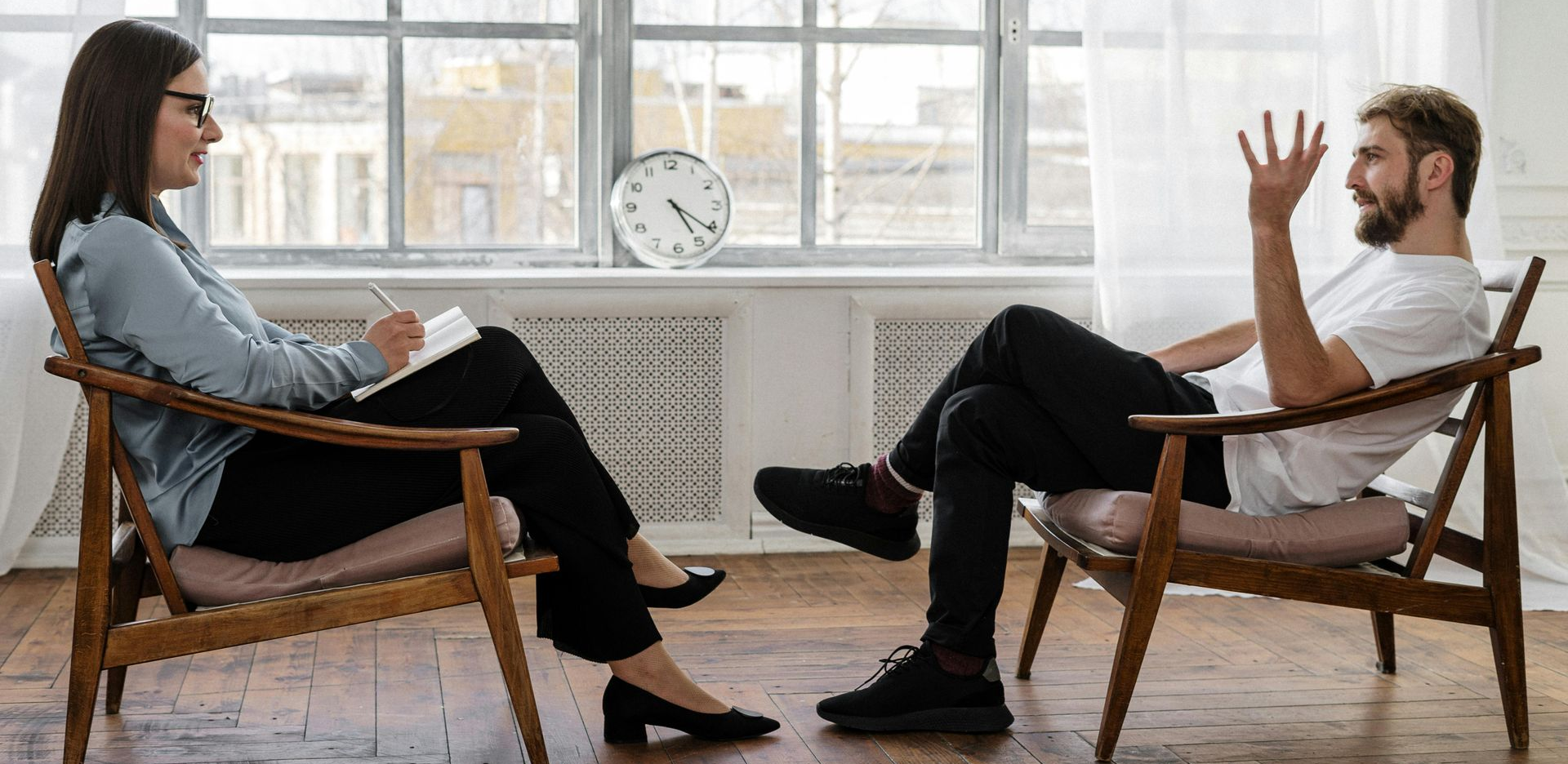Seeing results from psychotherapy

What is psychotherapy?
During psychotherapy, the patient and therapist are seated in armchairs opposite one another. Through talking, we can quickly and efficiently resolve an issue or « symptom », for example a relationship struggle, or a panic attack. Sometimes, however, the difficulties a patient encounters are more profound and deep seated, and so more time is needed. In psychotherapy, the patient and therapist simply « talk », and so on the surface it may look like chatting to a friend. It is not as simple as it appears, however. The therapist is very skilled and through years of education, training and clinical practice knows how to steer and guide the conversation so that the patient, through questioning and self-awareness, gains insight into their own internal struggles and starts solving them.
Treating complex trauma
Treatment of complex trauma is a delicate process that needs to be managed carefully and with skill in order to be successful. Many of my patients come in after having consulted numerous other therapists and having tried a multitude of different therapies. Sadly, despite initial dizzy promises, nothing ended up working. This is where being a « senior » therapist really helps. The therapist treating complex trauma, especially that which stems from childhood, needs to be stable, reliable and not easily frightened. Moreover, they need to be containing yet « non-directive » in order to give the patient sufficient autonomy and stength to build their self-esteem.
Complex trauma generally involves violence, abuse and/or neglect in the home. As a rule, these experiences are not isolated, i.e. they only happenned once or twice, but are a string of experiences that often unfolded over years if not decades of a person’s life. This affects not only the victim’s reactions, but their whole outlook on the world, their whole biology. Their are massive trust issues, there is a very fearful attachment style, and there is often a whole string of psychosomatic complaints.
The symptoms are many, some manageable, and some so intense they make daily functioning in the work place and at home extremely difficult if not impossible. They can include persistent sadness, difficulty regulating emotions, chronic anxiety, chronic guilt, flashbacks, hypervigilance and dissociation. Moreover, the symptoms can be trigerred by seemingly innocent situations, such as not responding to a text message quickly enough, being five minutes late for a meeting, or speaking in a loud voice.
To give a typical example, one of the things I see often in my office is when a female client sends a text to her boyfriend and doesn’t get an immediate response. The first reaction is anxiety, if not panic. Then, when the initial stage of severe anxiety subsides, she is easily trigerred to anger, outbursts and oppositional behaviours, even in the case where the boyfriend or husband replies to the text half an hour or so later, after his work meeting is over. My clients, being so extremely sensitive and jumpy, are using these extreme reactions as their only available defense mechanisms to feeling under threat. But under threat of what? Of abandonment, neglect or abuse, often all three. Because it’s what they experienced as a child, they are constantly relieving the experience, even recreating it although there is no threat in sight.
How long does it take?
Oftentimes, patients ask me, "How long will it take until I begin to see results? How long before I start to see tangible, real changes in my life?" This is a fair question. Therapy, even though it has become more and more accepted in recent years, is still a challenging business. If our health insurance or "Mutuelle" doesn’t reimburse the sessions, they may have to be paid out of pocket. This means that for many, therapy is a considerable investment. A financial investment, but moreover, a time investment too. We have to carve out of our already too-busy days not just the hour spent sitting in a therapist’s office but also the transportation time to go there and back. On top of this, good therapists have few available slots, so if they have an opening in the middle of the day that isn’t quite ideal, we take it anyway, cutting back on time elsewhere. When all this adds up, committing to therapy can mean quite a few sacrifices. Therefore, when and how do we see a return on our investment?
The answer is: it depends. Because each one of us is unique, it’s on a case-by-case basis. Many of my patients have reported feeling massive relief after a real "A-ha!" moment that occurred during the very first session. So is one session all it takes? For some, the answer is a definite yes. However, even those lucky ones may, if they so choose, come back and explore further the eye-opening experience they had at the very beginning of therapy. Others prefer a more regular rhythm, once every two weeks or once a month. If a patient is undergoing a particularly stressful period in their life, I am, of course, available for weekly sessions. These never last long, luckily, because as soon as there is palpable improvement, the sessions are spaced out.
Every therapist is unique and different too. Personally, I never impose a rhythm on my patients. At the end of every session, I will ask them if and when they next want to come back. Some people book the next appointment there and then; others wait until they can figure out their agenda for the next couple of days or weeks and let me know by text later on. My personal philosophy is that each patient should feel two things: free and secure, both at the same time. To feel free means to not feel constrained or smothered as they may be feeling in other relationships in their life. As long as each session is paid for, patients may come and go as they please. To feel secure means that the patient must feel the therapist is stable and dependable and that they are always there should they be needed, sometimes even at an extremely short notice. These two things contribute to cementing a solid therapeutic alliance, the key ingredient for sessions to be optimally successful.
Can psychotherapy help with physical illness?
Psychosomatics is basically everything to do with illness, being sick. Therapists, even though most of them are not medical doctors, are no strangers to sick people needing care. Whether it is to navigate the jungle of the medical system, to cope with debilitating side effects of treatment, or simply to ask: what does this illness say about me, as a person? How can I speed up my healing process? How can I deal with the possibility of the treatment not working and the worst case scenario coming about? All this, and much more, is talked about in the intimacy of the therapist’s office.
At first, a patient comes in ill. After some time, in the large majority of cases, they get better. Sometimes the progress is spectacular, sometimes it is slow and laborious yet undeniably there. Often the simple act of talking to an empathic human being in a safe setting suffices to bring down the psychic tension and alleviate numerous physical ailments. Once the improvement is felt, some patients choose to stop therapy, and some keep coming back. These patients want to understand why they fell ill in the first place, so they can prevent an eventual relapse, and feel safe and secure knowing it is them who have some control over the illness and its consequences. Therapy has the following benefits:
- Understanding why we fall ill
- Understanding what we can do do get better
- Understanding how to heal completely
- Adopting a new attitude to life, new behaviours and a new identity that will prevent a relapse
- Being comfortable in this new identity as a healthy person.






